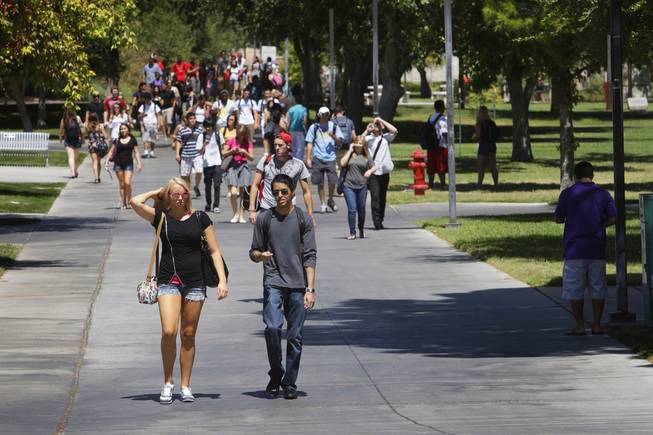
Students walk southbound in the quad area during the first day of the fall semester at UNLV Monday, August 23, 2010.
Tuesday, Nov. 15, 2011 | 2 a.m.
Sun archives
- With success of Singapore campus, UNLV eyes U.A.E. (7-4-2009)
- UNLV Singapore campus graduates first class (6-6-2009)
- Regents give go-ahead to explore UNLV campus in U.A.E. (4-4-2008)
- UNLV wants to open campus in Middle East (3-21-2008)
The number of international students in Nevada has declined slightly even as national enrollment figures rose to a record high, according to a federal report released Monday.
Nevada hosted 2,795 international students during the 2010-11 academic year, which represents a 2.7 percent decline from the previous school year.
A little more than half of those students come from Asia, with South Korea, China and Japan ranking among the top three countries sending their students to Nevada colleges and universities.
The Silver State ranks 40th in the nation in the number of foreign students, according to the “Open Doors” report compiled by the nonprofit Institute of International Education and the U.S. Department of State’s Bureau of Educational and Cultural Affairs.
This new state data comes as the number of international students in American colleges and universities increased by 5 percent to a record-high 723,277 students during the 2010-11 academic year. In the past decade, the number of international students has grown by 32 percent.
The growth of international students nationwide was fueled by a sharp increase in the number of Chinese students, whose numbers jumped by 43 percent at the undergraduate level. Chinese students now represent nearly one-fourth of all international students in the United States and the leading sending country for the second year in a row, according to the report.
“The United States is the destination of choice for higher education,” said Ann Stock, the assistant secretary of state for educational and cultural affairs. “We’re known worldwide as having the gold standard for the quality of our education system.”
The higher number of foreign students had a significant economic impact on the United States, Stock said. International students contributed more than $21 billion to the U.S. economy — that’s $66.3 million locally — through tuition, school supplies and living expenses in 2010. The study found that 63 percent of international students received the majority of their funding from personal and family sources.
Aside from the economic boon to college towns hit hard by the global recession, international students bring diversity to U.S. campuses, Stock said. Exposure to different cultures and languages will help prepare American students for the increasingly global economy, she said.
“We want foreign students to come here, but also for the U.S. students to learn about other countries,” she said. “Foreign students and U.S. students form networks and may start businesses together and work together in the future. We want to make sure our young people are prepared to work in a global environment.”
More and more American students are studying abroad, Stock said. A record 270,600 students studied abroad last year, which represented a 4 percent increase from the previous year, she said.
Still, only 1 percent of the entire student population studies abroad, Stock said. The federal government is trying to encourage more American students to study abroad. In 2009, President Barack Obama pledged to send 100,000 students to China by 2013.
The number of Nevada students studying abroad declined by 12.7 percent to 695 students in the 2009-10 school year, the latest available data, according to the study. Nevada produced 13 Fulbright Scholars in the past two years. The Fulbright Program offers grants to study, teach and conduct research for U.S. citizens to go abroad.
According to the study, UNLV has the highest number of foreigners with more than 1,300 international students enrolling this fall. The university saw a slight decrease in its international population, which is about 4.6 percent of the total student population. The number of international students has remained fairly constant in the past decade, according to UNLV’s student newspaper, the Rebel Yell.
UNLV has ramped up its recruiting presence in Asia, hiring a part-time recruiter in South Korea for the first time this year and encouraging university alumni to attend recruitment events, university spokeswoman Afsha Bawany said.
After international students arrive at UNLV, the university has several programs to help them acclimate to campus life in Las Vegas, including a special orientation session, special academic advisers and career services to help them land internships and navigate student and work visas.
Following the national trend, the majority of UNLV’s international students come from Asia, with South Korea, China, India and Japan rounding out the top four sending countries.
The majority of these students are enrolled in its world-renowned hotel administration program, Bawany said.
“A lot of the tourism industry is growing immensely in Asia,” she said. “These students want to bring back those (hospitality) lessons to Asia.”

Join the Discussion:
Check this out for a full explanation of our conversion to the LiveFyre commenting system and instructions on how to sign up for an account.
Full comments policy